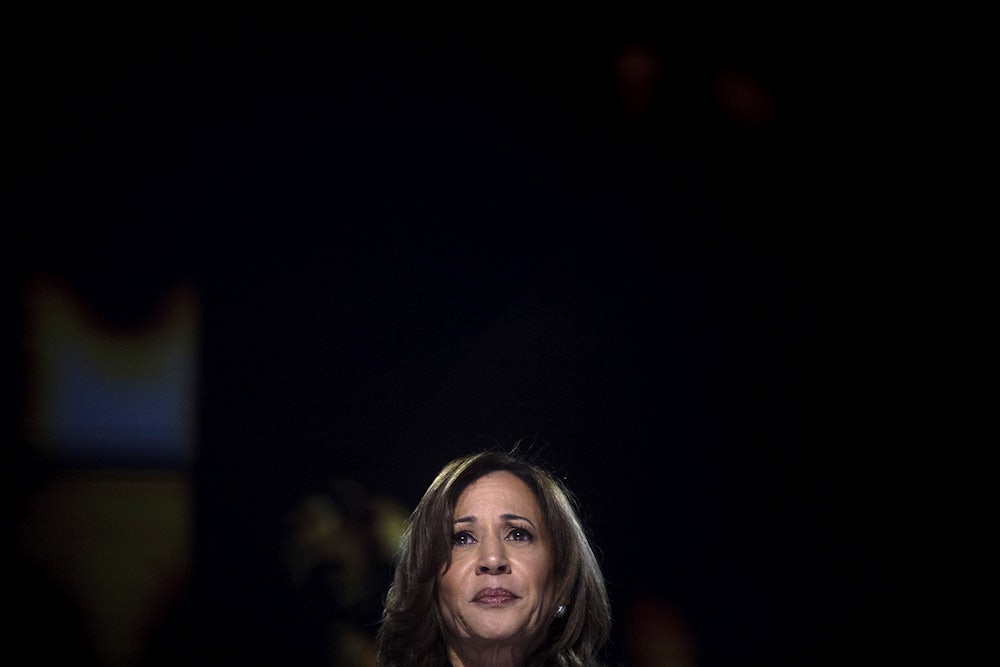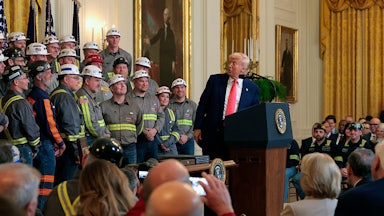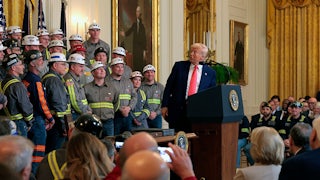At the Democratic National Convention on Thursday, for the first time all week, climate change was a major topic on the main stage. “An American president must lead the world in tackling climate change,” said Interior Secretary Deb Haaland. “We need a president who understands that assignment.” Journalist John Russell referenced the historic labor struggles of coal miners in Appalachia, noting that “Washington listened to rich men who demanded that we stick with dirty energy at energy cost.” And Florida Congressman Maxwell Frost called fighting the climate crisis “patriotic.” And finally, Kamala Harris stated in her acceptance speech that Americans should be free “to breathe clean air and drink clean water, and live free from the pollution that fuels the climate crisis.”
It was a disappointingly brief mention, given the rising human and economic costs of climate change and the fact that this year could be the hottest ever recorded. But it wasn’t the only disappointing moment in Harris’s speech, as she addressed yet another topic that had gotten short shrift inside Chicago’s United Center this week.
After pro-Palestinian delegates and the Uncommitted National Movement continued to push for a cease-fire and embargo on arms shipments to Israel—and, unsuccessfully, to let a Palestinian American speak at the convention—Harris said that “what has happened in Gaza over the past 10 months is devastating. So many innocent lives lost. Desperate, hungry people fleeing for safety, over and over again.” Harris insisted that she and Biden were “working to end this war, such that Israel is secure, the hostages are released, the suffering in Gaza ends, and the Palestinian people can realize their right to dignity, security, freedom, and self-determination.”
There’s more connecting the mentions of climate and Palestine at the DNC than the fact that there wasn’t much substance to it. Discussing either the climate crisis or Israel’s war on Gaza in any convincing fashion requires specifics: Who, exactly, is spewing all of those heat-trapping emissions? And who is taking all those innocent Palestinian lives? More importantly, ending all of that suffering—from global warming and war alike—requires a willingness to challenge the forces responsible for it with more than words. The convention showcased a party that isn’t willing to do any of this.
That’s not to say there hasn’t been movement on either front. The Inflation Reduction Act is a major achievement that likely wouldn’t have happened were it not for climate organizers pushing for a far more expansive Green New Deal. Even the party’s somewhat ham-fisted jabs at “Big Oil” are a sign of progress. While it’s a shamefully low bar, the Biden-Harris administration has done more to reduce emissions than any of its predecessors. It’s similarly unheard of for prominent Democrats—much less a presidential candidate—to acknowledge the humanity of Palestinians and their suffering.
Talk is cheap, though. The U.S. is continuing to regularly furnish Israel with billions of dollars in weapons that is has been using to bomb schools, hospitals, and refugee camps, defying our country’s own laws on weapons transfers. Just today, HuffPost’s Akbar Shahid Ahmed reported that the Biden-Harris administration has appointed an official who oversees and advocates for those shipments to a new senior post in the State Department where he’ll shape policy on Israeli-Palestinian affairs. At the DNC, Democrats refused to make even mild concessions to those calling for a cease-fire and arms embargo. Uncommitted delegates had been pushing event organizers for weeks to secure a speaking slot. They’d presented dozens of possible names, including Palestinian American Georgia State Representative Ruwa Romman. Those requests were all refused.
And while the U.S. is indeed investing historic amounts of money to build renewable energy and electric vehicles, Harris and her surrogates have continued to boast about the fact that her administration has overseen record levels of oil and gas production. “Today,” Harris said at a rally last month at a rally in North Carolina, “America has record energy production and we are energy independent.” The party’s platform touts the same language, and promises to “boost supply” of gasoline. As I wrote earlier this week, that can virtually only happen by offering the industry additional subsidies.
There is no route to addressing the climate crisis—or even meeting the White House’s own climate goals—without directly challenging the core business model of the fossil fuel industry. There is no way to end the suffering in Gaza without provoking the anger of the Israeli government and lobbying groups like AIPAC. Avoiding those conflicts carries some obvious short-term benefits for Democrats, like keeping wealthy donors and some swing-state voters happy. Continuing to avoid them promises not just to prolong suffering, but invite calamities that there’ll be no turning back from.






